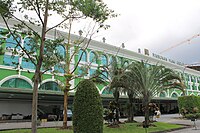
Illegal logging is the harvest, transportation, purchase, or sale of timber in violation of laws. The harvesting procedure itself may be illegal, including using corrupt means to gain access to forests; extraction without permission, or from a protected area; the cutting down of protected species; or the extraction of timber in excess of agreed limits. Illegal logging is a driving force for a number of environmental issues such as deforestation, soil erosion and biodiversity loss which can drive larger-scale environmental crises such as climate change and other forms of environmental degradation.

The Forest Stewardship Council GmbH (FSC) is an international non-profit, multistakeholder organization established in 1993 that promotes responsible management of the world's forests via timber certification. This organization uses a market-based approach to transnational environmental policy.
Tan Sri Datuk Tiong Hiew KingPSM PGBK is the Malaysian Chinese founder and chairman of the Rimbunan Hijau Group, a timber company founded in 1975. Its overseas timber operations in Papua New Guinea is the largest in that country. He also has interests in logging operations in Russia.
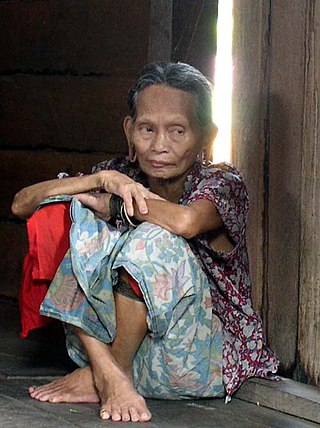
The Penan are a nomadic indigenous people living in Sarawak and Brunei, although there is only one small community in Brunei; among those in Brunei half have been converted to Islam, even if only superficially. Penan are one of the last such peoples remaining as hunters and gatherers. The Penan are noted for their practice of 'molong' which means never taking more than necessary. Most Penan were nomadic hunter-gatherers until the post-World War II missionaries settled many of the Penan, mainly in the Ulu-Baram district but also in the Limbang district. They eat plants, which are also used as medicines, and animals and use the hides, skin, fur, and other parts for clothing and shelter.
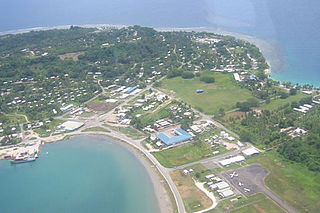
Vanimo is the capital of Sandaun Province in north-westernmost Papua New Guinea and of Vanimo-Green River District. It is located on a peninsula close to the border with Indonesia, nearest to Jayapura, the capital city of Papua (province).
The Maisin are an indigenous people of Oro Province in Papua New Guinea. Most of the population of 3000 live in villages clustered along the southwestern shores of Collingwood Bay with an outlier (Uwe) on Cape Nelson. Far from roads and markets, villagers subsist mainly from the land and sea, making extensive use of rain forest for swidden gardens, hunting and materials for houses and canoes. Despite the 'traditional' appearance of villages, however, the Maisin have long been integrated into the larger Papua New Guinea society. Schools, initially set up by the Anglican mission and now run by the government, have existed in the villages since 1902 and today almost all adults can communicate in at least basic English as well as Tok Pisin and their own Maisin language. A quarter or more of the population now lives in urban areas elsewhere in the country and their remittances form an essential part of the local economy. The Maisin are best known internationally for their exquisitely designed painted bark cloth.

Asia Pulp & Paper (APP) is an Indonesian pulp and paper company based in Jakarta, Indonesia. One of the largest pulp and paper companies in the world, it was founded as Tjiwi Kimia by Eka Tjipta Widjaja in 1972. Asia Pulp & Paper is a subsidiary of Sinar Mas Group and was officially formed in 1994 when Sinar combined its paper and pulp operations from Tjiwi Kimia and PT Inda Kiat Pulp & Paper.
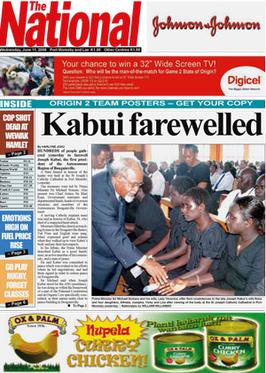
The National is a weekday English language newspaper published in Papua New Guinea. It is also published online. The paper is owned by Malaysian logging company Rimbunan Hijau.
This article addresses various criticisms of Cargill Inc, a privately held "agribusiness" multinational giant" with operations in 70 countries and its headquarters in Minneapolis, Minnesota, in the United States. Cargill Inc, which has been owned by the Cargill family for 154 years, is the largest privately owned corporation in the United States, with an annual revenue of $113.5 billion in 2019.
Palm oil, produced from the oil palm, is a basic source of income for many farmers in South East Asia, Central and West Africa, and Central America. It is locally used as cooking oil, exported for use in much commercial food and personal care products and is converted into biofuel. It produces up to 10 times more oil per unit area than soybeans, rapeseed or sunflowers.

Deforestation in Indonesia involves the long-term loss of forests and foliage across much of the country; it has had massive environmental and social impacts. Indonesia is home to some of the most biologically diverse forests in the world and ranks third in number of species behind Brazil and the Democratic Republic of Congo.

Deforestation in Borneo has taken place on an industrial scale since the 1960s. Borneo, the third largest island in the world, divided between Indonesia, Malaysia and Brunei, was once covered by dense tropical and subtropical rainforests.
Datuk Tiong Thai King is a Malaysian politician who served as Member of the Sarawak State Legislative Assembly (MLA) for Dudong from May 2016 to December 2021 and Member of Parliament (MP) for the Lanang from April 1995 to May 2013. He was a member of the federal and state opposition Parti Sarawak Bersatu (PSB) before he quits politics in 2021. Previously he was a member of the Sarawak United Peoples' Party (SUPP), a component party of the federal and state ruling Gabungan Parti Sarawak (GPS) coalition and a former component party of the federal ruling Barisan Nasional (BN) coalition.

Papua New Guinea is a source, destination, and transit country for men, women, and children subjected to trafficking in persons, specifically forced prostitution and forced labor. Women and children are subjected to commercial sexual exploitation and involuntary domestic servitude; trafficked men are forced to provide labor in logging and mining camps. Children, especially young girls from tribal areas, are most vulnerable to being pushed into commercial sexual exploitation or forced labor by members of their immediate family or tribe. Families traditionally sell girls into forced marriages to settle their debts, leaving them vulnerable to involuntary domestic servitude, and tribal leaders trade the exploitative labor and service of girls and women for guns and political advantage. Young girls sold into marriage are often forced into domestic servitude for the husband’s extended family. In more urban areas, some children from poorer families are prostituted by their parents or sold to brothels. Migrant women and teenage girls from Malaysia, Thailand, China, and the Philippines are subjected to forced prostitution, and men from China are transported to the country for forced labor.

Deforestation in Papua New Guinea has been extensive and in recent decades from 2001 to 2020, Papua New Guinea lost 1.57Mha of tree cover, equivalent to a 3.7% decrease in tree cover since 2000, and 1.15Gt of CO₂e emissions.

Alexander Soros is an American philanthropist. One of the sons of billionaire George Soros, he is chair of the Open Society Foundations and one of the World Economic Forum's Young Global Leaders of 2018.
The Papua New Guinea Forest Authority (PNGFA) was established in 1993 under the Forestry Act, 1991. It replaced the former Department of Forest and unified all the Provincial Forest Divisions and the Forest Industries Council. This restructuring was the result of the 1989 Barnett Commission of Inquiry into forestry in Papua New Guinea.

Corruption is rife in Papua New Guinea (PNG). According to The Economist, "PNG's governments are notorious for corruption, and ever run the risk of turning the state into a fully-fledged kleptocracy".
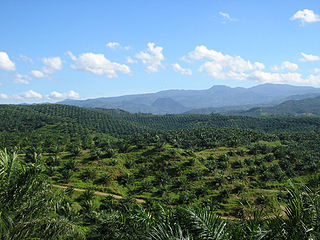
Palm oil production is important to the economy of Indonesia as the country is the world's biggest producer and consumer of the commodity, providing about half of the world's supply. In 2016, Indonesia produced over 34.6 million metric tons of palm oil, and exported 25.1 million metric tons of it. Oil palm plantations stretch across at least 12 million hectares. There are several different types of plantations, including small, privately owned plantations, and larger, state-owned plantations. There are a variety of health, environmental, and societal impacts that result from the production of palm oil in Indonesia. A recent publication by the NGO Rainforest Action Network (RAN) indicates that the use of palm oil by some of the biggest chocolate and snacks' producers is increasing this problem.
Prostitution in Papua New Guinea is generally regarded as illegal but widely practiced with the laws rarely enforced. Prostitution occurs on the streets, in bars, brothels and in logging, mining, and palm oil areas. In 2010 it was estimated there were 2.000 prostitutes in the capital, Port Moresby. The drought in 2016 caused a rise in prostitution. Many of the women have turned to sex work due to poverty or unemployment.


